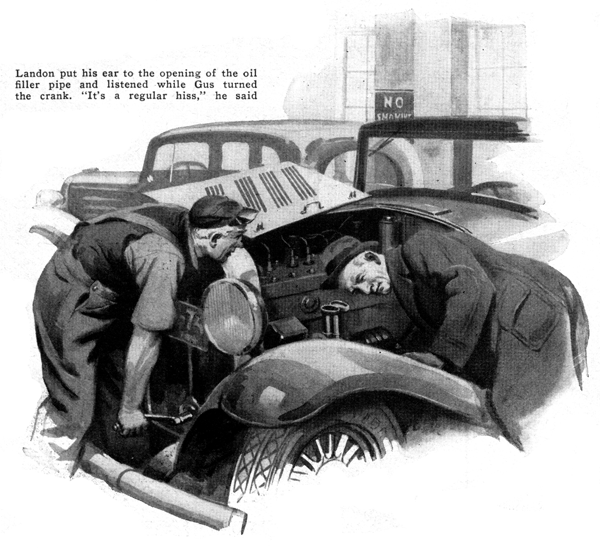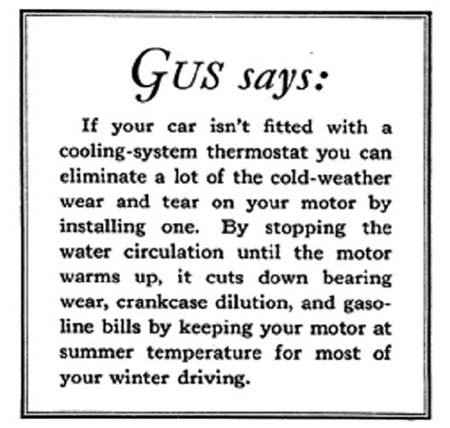February 1935
DOES YOUR CAR NEED NEW PISTON RINGS?
by Martin Bunn

"If there's anything that gets my goat," grumbled Gus Wilson. "it's the fellow who's always thinking there's something wrong with his car."
"Well, then, you'd better hide your goat," grinned Joe Clark. "Here comes the world's worst." Gus looked up just in time to see Ted Landon's car roll into the Model Garage driveway.
"Got time to check my anti-freeze, Gus?" the driver called.
"Sure thing," replied Gus. "Run her inside."
"And while you're at it," suggested Landon, "you might check the battery and kind of look things over. Seems to me she starts a little hard, these cold mornings."
As Gus worked, Landon wandered around the shop inspecting the assortment of tools and parts. "Do all cars have cast-iron pistons?" he asked, fingering one of the pistons on Gus's bench.
"Not by a long shot," replied the mechanic. "Aluminum-alloy pistons are just as popular. Then there are nickel-iron, cast-iron, and semi-steel pistons."
"Why so many different kinds? One type must be best."
"It's differences of opinion that make the world go 'round," replied Gus with a grin. "Each type has its good points and to argue their pros and cons is worse than a row over religion. Why the sudden interest in pistons?"
"Oh, nothing," the customer replied. "Only I've been thinking maybe I ought to treat this bus of mine to a new set of pistons and rings."
"What gave you that happy thought?" asked Gus, looking up from his work with surprise.
"The car's ready for them," Landon replied. "She's gone over fifteen thousand miles and seems to smoke more this winter than she use to."
"Smoke?" repeated Gus.
"Yeah, especially when I first start her up. Sort of whitish and it puffs out of the exhaust in regular clouds."
"Plenty of brand new cars do that in cold weather," replied Gus with a chuckle.
"That's just the cold air condensing the moisture and unburned gasoline. If that's all you've got on your mind, you can stop worrying."
"But that isn't all," Landon insisted. "She smokes sometimes going down hills."
"Some cars do that too. When the wheels work against the engine, the pumping of the pistons tends to push oil up into the cylinders. Naturally, as soon as you speed her up again, the oil is burned. You don't use much oil, do you?"
"About a quart in seven hundred miles," said Landon.
"Nothing so startling about that," Gus assured him. "Your car's is a little older than it used to be. The bearings aren't so tight, and the moving parts are a little worn. Naturally, you're going to use more oil. You don't know what it is to feed an honest-to-goodness oil-pumper."
"Well, just what are the symptoms of worn piston rings?"
Without answering, Gus put down his tools and walked over to a group of cars parked at the rear of his shop. "Here's a first-class example," he said, pausing in front of a three-year-old sedan. "First of all, she eats a quart of oil every hundred miles and to trail her is like following a freight train through a tunnel.
"On top of that," Gus continued as he fished a crank out of the tool compartment and pushed it into the hole under the radiator, "she hasn't any compression. Here, turn this crank and you'll see what I mean."
"Does turn sort of easy," Landon agreed, as he wound the crank.
"Right. Now try cranking your own car."
This time Landon found the job a little more difficult. The crank seemed to resist him at regular intervals. "Got more spring to it," he reported.
"That's it. The rings are tight enough to hold compression," explained Gus. "Why, the rings on this other crate are so loose you can hear the pressure leak by."
Landon looked at him blankly. "You can hear it?" he said doubtfully.
"Sure. Pull the cap off that oil filler pipe and park your ear close to the opening while I turn the crank."
As Gus cranked, Landon listened. A pleased grin spread over his face. "Well, I'll be darned," he exclaimed. "It's a regular hiss like gas coming out."
Gus nodded. "On some cars it's so bad you can hear it even when the motor's running. In any case, that's a blamed good sign of blow-by caused by leaky piston rings."
"How about the spark plugs?" inquired Landon, as he slipped the oil filler cap back into place. "Don't bum rings foul the points with oil?"
"Maybe yes and maybe no. It's a funny thing about all these signs of leaky piston rings -- they don't always follow the rules. Had a car in here just the other day that had all the symptoms except one -- high oil consumption. It had no power. You could hear the blow-by. It had no compression, used lots of gas, and the spark plugs were always fouling. Still, the customer swore he never had to buy a quart of oil from one oil change to the next."
"How do you account for that?"
"Only one thing could cause it," Gus replied. "Gasoline was leaking down past the pistons just as fast as the oil was being burned, so it sort of struck a balance. After the first few hundred miles with new oil, that motor was being lubricated with a weak mixture of gas and oil, but the car owner didn't know that."
"You wouldn't think enough gasoline could get by the pistons to make that much difference," ventured Landon.
Gus grinned. "You'd be surprised. Why, I've seen cars that were much worse than that. One buggy passed so much gasoline that you just about had to bail the crankcase out to keep it from overflowing. You may not believe it, but the crankcase mixture would gain as much as a quart in a hundred miles."
"Well, one thing sure, if a car uses lots of oil it's a pretty good sign it can stand a ring job, isn't it?" insisted Landon.
"Yes and no again. Stuck rings or rings with their gaps in line will run oil consumption up, to say nothing of what crankcase leaks will do. It's the same way with poor compression. Bad rings cause poor compression, but poor compression doesn't always mean that the rings are bad. A loose cylinder head, a bad gasket, worn valves, or wrong valve adjustment will kill compression just as fast as leaky rings.
"A few minutes ago you asked if fouled plugs meant worn rings. Sometimes they do, and sometimes they don't. Poor ignition or bad plugs will foul the points just as fast as oil leaking by the rings, and still I've seen plenty of oil pumpers that never fouled a plug."
Landon wagged his head. "Gosh at that rate it's pretty hard to know when a car needs new rings and when it doesn't."
"Oh, it's not so bad. Only you can't count too much on any one sign. When your car really needs new rings, you'll know it. The first sign of trouble will be when she loses power and maybe develops a bad miss at low speed. About that time you'll notice that you have to buy more gas than you used too, and chances are your oil bill will start to go up. Then you'll notice that your exhaust smokes, not just when you start in cold weather or when you speed up after coasting down a hill, but all the time."
"Is there any sense in trying to use heavier oil to make up for worn rings?" asked Landon.
"You can't make oil take the place of metal. The only thing a heavier oil will do is waste gas. Once the rings are worn nothing will do any good but a first-class ring job with new piston pins, a check-up on the connecting rods new pistons and a cylinder refinishing if they're needed, and a general tightening up of the bearings."
By this time Gus had finished his work on Landon's car and the owner sat idling the motor while Joe Clark pushed open the garage doors.
"You know," Gus sighed as Landon piloted his car out through the driveway. "I've sort of changed my mind about that fellow. If more owners were on the lookout for worn rings we'd have lots less trouble trying to put pep back into cars with scored cylinder walls, burned pistons, and battered bearings. That would save everybody a lot of grief."
END
L. Osbone 2019
